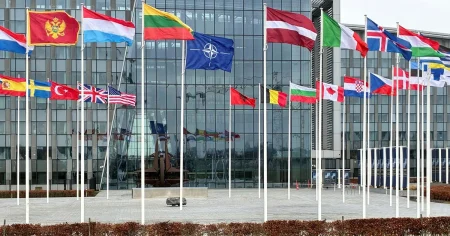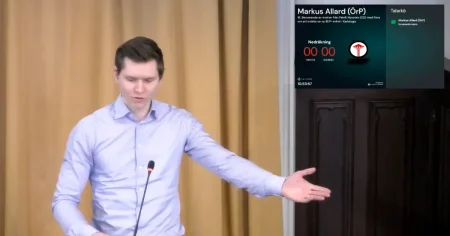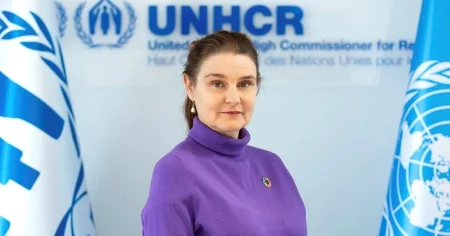Paragraph 1: The Genesis of the Conflict
The current turmoil within the Center Party (Centerpartiet) traces back to Muharrem Demirok’s endorsement of Magdalena Andersson as his preferred prime ministerial candidate over a year ago. This declaration, made during an interview, solidified the party’s stance against any collaboration with the Sweden Democrats (Sverigedemokraterna), a position that continues to be a cornerstone of their political strategy. While Demirok’s preference for Andersson seemed to align with the Center Party’s efforts to build bridges with other opposition parties, including the Social Democrats, it also sparked internal dissent. An undercurrent of unease, voiced by anonymous sources within the party, questioned whether this rapprochement with the left was truly representative of the broader party membership.
Paragraph 2: The Controversial Vote and Its Aftermath
The simmering discontent erupted into open conflict following a contentious party board meeting. Reports emerged of a vote initiated by Demirok that seemed to push for a formal endorsement of Andersson as the Center Party’s preferred prime minister. While the official agenda focused on general election strategies, emphasizing policy-focused campaigning and the importance of significant influence in any potential coalition, anonymous sources claimed the vote was a veiled attempt to solidify support for Andersson. The lack of prior consultation with the party board regarding this vote further fueled the flames of dissent, leading to accusations of undemocratic practices and even calls for Demirok’s resignation. The controversy quickly spread beyond the party board, with multiple media outlets reporting on the growing internal opposition to Demirok’s leadership.
Paragraph 3: The Backlash Against Anonymity and Internal Divisions
The reliance on anonymous sources to criticize Demirok’s leadership further exacerbated the internal rift within the Center Party. While no members of the parliamentary group or the party board publicly voiced their concerns, the whispers of dissent created a climate of suspicion and distrust. Prominent figures within the party, including Hanna Wagenius and Abir al-Sahlani, condemned the use of anonymity, arguing that it undermines open dialogue and fosters unhealthy internal politics. Al-Sahlani’s particularly strong stance, suggesting that those using anonymity should leave the party, deepened the divide rather than bridging it. The accusations also targeted specific individuals, such as party board member Elisabeth Thand Ringqvist, who was allegedly a driving force behind the criticism of Demirok – a claim she vehemently denied while reaffirming her full confidence in the party leader.
Paragraph 4: Demirok’s Appeal for Unity and Clarification of Stance
Faced with mounting criticism, Demirok publicly appealed for internal resolution, urging party members to engage in open dialogue rather than resorting to anonymous attacks. He emphasized the need for unity and stressed that no decisions regarding coalition partners would be made without the full participation of the party’s grassroots members. While acknowledging his preference for Andersson, Demirok clarified that as long as the Moderate Party and other center-right parties maintain their alliance with the Sweden Democrats, a right-leaning coalition remains out of the question for the Center Party. He reiterated his commitment to a democratic process, assuring members that their voices would be heard in any future decisions regarding coalition formations.
Paragraph 5: The "Crisis Meeting" and the Path Forward
In an attempt to address the escalating internal conflict, the Center Party convened an extraordinary meeting with district chairpersons across the country. This meeting, widely dubbed a "crisis meeting" by media outlets, served as a platform for Demirok to directly address the concerns of party representatives and seek a path towards reconciliation. The outcome of this meeting is crucial for the party’s future. It remains to be seen whether Demirok’s reassurances and commitment to inclusivity will successfully quell the dissent or if the internal divisions will continue to fester, potentially impacting the party’s performance in the upcoming elections. The meeting represents a critical juncture for the Center Party, demanding a delicate balance between upholding core principles and maintaining internal cohesion.
Paragraph 6: The Stakes and the Uncertain Future
The internal strife within the Center Party highlights the complex challenges facing Swedish politics. The rise of the Sweden Democrats has fractured traditional political alliances, forcing parties to re-evaluate their partnerships and priorities. For the Center Party, the balancing act between maintaining its ideological stance against collaboration with the far-right and navigating the complexities of coalition building is proving particularly difficult. Demirok’s leadership is being tested, and the party’s ability to overcome this internal conflict will significantly impact its future trajectory. The outcome of the "crisis meeting" and the subsequent actions taken by both Demirok and his critics will determine whether the Center Party can emerge from this turmoil united and ready to face the upcoming electoral challenges or whether the internal divisions will continue to undermine its strength and influence.














